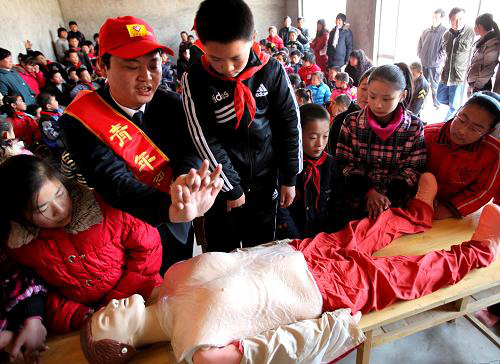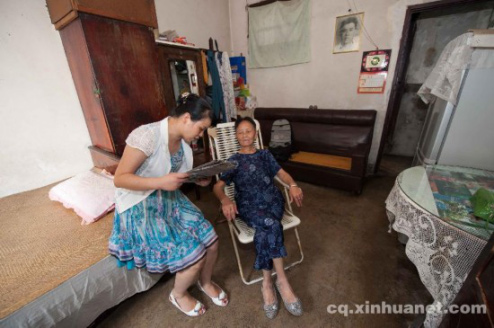By Tom McGregor, CCTV.com Panview commentator and editor
Editor's Note: CCTV.com Panview presents 'China Cares' — series of special coverage on China's rural reforms, charities and comprehensive efforts to help those in poverty unlock their potential for success.
The Chinese spirit for charity continues to rise as more citizens have reaped in higher incomes due to the country’s rapid development. Hundreds of millions of families have escaped poverty in the past few decades.
Despite the amazing economic transformation, not everyone has overcome living under impoverished circumstances. Chinese President Xi Jinping hopes to eradicate poverty in the nation by 2020, but the government cannot fix the problem by itself.
While China enters the sustainable development mode of economic growth, the nationwide campaign to eliminate poverty requires joint efforts from the government, as well as private citizens and companies.
Beijing has already taken a huge step since the Ministry of Civil Affairs announced in early September 2017 the country has over 50 million registered volunteers.
Figures to be proud of
According to WomenofChina Website, as of the end of August, China has 306,000 volunteer service organizations. 2,109 NGOs (non-government organizations) are fully-registered, while 513 of them are permitted to raise donations in public.
In 2016, total charitable donations raised in the country stood at RMB80bn (US$12.2bn). The statistics are startling when considering that many Chinese have long been reluctant to donate cash to community service organizations.
Due to traditional customs, many Chinese were raised to act generous with family and friends but not for those outside their networking circles.
They feared giving money to organizations that claim to represent a charity were fraudulent. However, the Chinese government has launched a vigorous campaign to combat corruption, including illegal charities, and so the groups must meet stringent requirements to qualify as registered NGOs.
The measures have helped to boost transparency and honesty among charities, which have inspired more Chinese to donate money and enroll as volunteers.
Staying young at heart
For charity groups to succeed in future generations, they must rely on the youth to serve as volunteers and the nation’s largest youth organization - Communist Youth League of China (CYLC) is playing a crucial role.

(A volunteer is showing pupils first-aid operations in electricity shocks Photo from Xinhua)
In 2013, Wang Hongyan, the then-head of the CYLC’s secretariat, introduced an initiative to have more than 20 million youths enrolled as registered volunteers by 2020.
She explained that young people will likely join “image booster” projects or they will refrain from participating.
“They (youth) vote with their feet,” Mrs. Wang told China Daily. “If a program doesn’t sound appealing, they will not come.”
At a press conference in Beijing organized by the State Council Information Office in 2013, Mrs. Wang unveiled a blueprint to encourage more youths to volunteer.
Stepping up to the plate
“Most volunteers … have three different channels through which to serve - youth leagues, grassroots NGOs and community-based organizations aligned with Civil Affairs departments,” said Deng Guosheng, director Tsinghua University’s NGO Research Center.
Deng added, “Youth Leagues in China boast the largest number of volunteers, but most of them are not active.”
As one of China’s foremost experts on NGOs, Deng encourages Youth Leagues to act as service providers to assist with fundraisers, training and support.
The main challenge many charity groups face are low funding. Many directors and participants of NGOs hold brilliant ideas to help the less fortunate, but without sufficient cash they can’t achieve the desired results for the greater good.
Some CYLC chapters have already set up pilot projects to explore deeper cooperation with NGOs and creating incubators to empower volunteer organizations.
Taking care for seniors
China should expect the nation’s youth to serve as the backbone of community service activities, but municipal officials in Shanghai have noticed that volunteers have paid little attention to caring for elderly residents.
In March 2017, the Institute of Sociology at Shanghai Academy of Social Sciences and the Shanghai Volunteer Association had conducted a survey of 1,005 volunteers and 2,000 local residents and released a report.
Shanghai has around 2.6 million registered volunteers and 22,000 charity organizations sponsoring over 110,000 projects. But only 5.8 percent of the projects directly help the elderly and just a few people are providing medical care for them.
The Chinese have embraced Confucian values, which urge the young to care for parents in their twilight years, but the report has proven otherwise.
Actually, the study also revealed that many volunteers are not performing heroic deeds, since around 40 percent of local volunteers simply serve as walking guides who give directions to people who have gotten lost.
Volunteering - an act of courage
Volunteering is more than just saying or performing a few feel-good deeds. At times, volunteers are expected to go above and beyond the call of duty to help those who can’t help themselves.

(A volunteer is reading newspaper to a 83-year granny Photo from Xinhua)
The elderly are most in need of urgent care and as the country faces the demographic trend of an aging population, China’s 50+ million registered volunteers should forge ahead and make greater efforts to provide necessary assistance to senior citizens, many of whom are enduring loneliness, illness and depression on a daily basis.
They require more love than others and deservedly so.
Tmcgregorchina@yahoo.com
(The opinions expressed here do not necessarily reflect the opinions of Panview or CCTV.com. )

Panview offers a new window of understanding the world as well as China through the views, opinions, and analysis of experts. We also welcome outside submissions, so feel free to send in your own editorials to "globalopinion@vip.cntv.cn" for consideration.
















